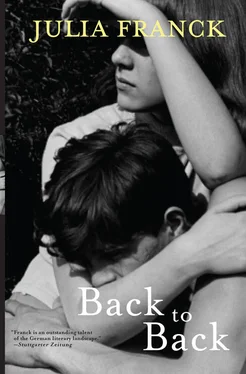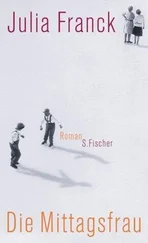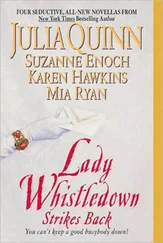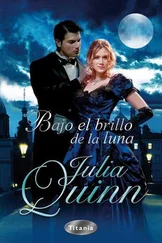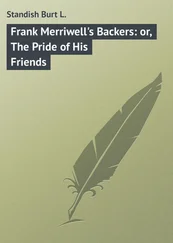Oh, leave me alone. Thomas was sitting on the edge of his bed, as weak as ever. Ella asked what the woman had done, how she had worked magic. She had only put her hands on his shoulders, said Thomas, she hadn’t even touched his rash, no spells and incantations, or not aloud anyway. Ella couldn’t believe it.
Maybe I can do better. Can I have a go? Ella raised her hands as if conjuring up spirits. But to Thomas it was serious; she had better go away.
While Käthe was finishing the Dancing Couple, and Ella was in her room trying to burn small lumps of resin — she had scraped them off the bark of trees in the summer and kept them in a box — to try out her own powers of witchcraft, Thomas’s rash turned darker and formed scabs. The resin didn’t burn, it only sweltered and turned black where the flames had licked it. Ella invented magic words: Guttlenuts and Shatzlebrutz.
After tomorrow we can all go back to our work, stated Käthe, relieved, at the end of the second week. They were sitting at the supper table, together with a certain Susanne and a certain Kalle, models for the Dancing Couple . What did I tell you? Käthe proudly looked round the table. Thomas’s rash had dried up and the scabs were already coming off many places on his skin. The magic powers of the sales assistant from Erkner had proved their worth. There was no doubt that Thomas’s cure was all due to Käthe, it was her success. Ella wondered how she could let it be known that she, too, had powers of witchcraft.
I know a fairy who works magic, I gave her a quick call, and guess what, Thomas is better now! You just have to know what will help. Pass the butter.
Susanne passed Käthe the butter. A real enchantress?
Well, it helped, anyway. You’ll be taking the early train to Gommern tomorrow, won’t you, Thomas?
Thomas sat hunched at the end of the table. He was chewing his coarse wholemeal bread very thoroughly, and had taken no part in the conversation yet.
Thomas?
Thomas nodded obediently; he wanted to have chewed the bread well before he opened his mouth. Since he ate so slowly, the conversation had usually got away from him before he could contribute to it.
What they do there is just fabulous, Käthe now told her guests happily. They’re bringing stones from all different eras to the light of day, the famous quartzite and slate of the Lower Carboniferous period, fine sandstone from the Pleistocene. Truly unique. Well, of course Ulbricht hopes we can be independent and find our own oil — for Ulbricht, there has to be that bit of hope. But for scientific research it’s all gain. Do say something, Thomas.
What do you expect me to say?
Since you’ve been home you haven’t told us anything about Gommern. A piece of cauliflower fell out of Käthe’s mouth; she wiped her greasy lips with the back of her hand.
What do you expect me to tell you? We’re just breaking up stones, hauling them to the truck or taking them to the next station. Thomas was smiling like an angel.
Don’t play it down. You’re acting as if you were a building worker.
Not at all, I don’t build anything. Quite the opposite, I’m hacking away to destroy the earth. A miner, maybe, no, not even that. I just help, I just lug stones about. Bored, Thomas yawned. He put his hand in front of his mouth and looked gloomily across the table with his sick eyes.
Children! Without deigning to give him so much as a glance, Käthe made a brief and clearly dismissive gesture in Thomas’s direction; she turned cheerfully to their two guests, not much older than Thomas and Ella, who had spent the day modelling for her. Didn’t you say you’re studying economics in Karshorst now? That’s amazing! Käthe drew the cauliflower salad towards her and ate what was left of the stem straight from the bowl.
Since Susi’s been a Free German Youth leader we’re on the move round the clock. And we’re doing handicrafts too, making things for the Christmas market, and going into the schools in January.
Making things for the Christmas market? Käthe articulated the words Christmas market as if they evoked Popocatepetl. Her mouth had dropped open. But why?
We do our bit everywhere, you know that. The Free German Youth goes into the factories, into the schools, among the people, everywhere. Susi sipped her wine, smiling.
Terrific. Fabulous. That’s what I call fabulous. Käthe seemed relieved at first. Then she stopped and thought. But how do you manage to study as well?
Oh, working with the Free German Youth is fun, said Susi, putting her glass down.
And but for the Free German Youth it wouldn’t have been so easy to get a place to study. Kalle spoke with a heavy Berlin accent; Käthe liked that, and was tempted to emulate him. But it was clear that she had had difficulty in understanding exactly what he said. How was she to react? She knew that Thomas was obstinate enough to decline to join the youth organisation. And even with the prospect of taking her final exam as an inducement, Ella had made the mistake of leaving it again.
If we got places to study at all, Susi pointed out.
I believe you! Käthe looked past Thomas and Ella, an expression of reproof in her eyes. Two clever young people sat there before her who supported the Republic and did not, like her children, refuse to lend a hand.
In mid-December Thomas came back to Berlin from Gommern for the second time, only a week earlier than expected. But he had been sent back because of a recurrence of his rash. Once again the sales assistant from Erkner who worked magic had to be called in, and the doctor came to see Thomas as well. On the same day the phone rang. After a long illness he had passed away, were the words with which Käthe’s mother gave the news of her husband’s death. Perhaps it should be described as a blessed release, he didn’t have to suffer any more. He had been Käthe’s father the professor, the Vati she revered, she didn’t believe in blessed releases. She sat at the table in silence, staring at the tablecloth.
Her brother Paul and his family were coming from America for the funeral, and her sister Erna and Erna’s husband were coming from England, so the professor’s son and younger daughter would both be here. However, the German Democratic Republic wasn’t going to let them into the country on flimsy grounds. The family did battle with all means at its disposal against formalities, documents were certified, sent off, file numbers were communicated, and two days before the funeral the entry permits were granted. For the funeral, and between Christmas and New Year, Uncle Paul’s family and Erna with her husband stayed with Käthe. Käthe warned her children not to tell their relations about Thomas’s illness in case they feared infection. She was obviously embarrassed by the fact that Thomas was ill. As their beds were needed for the visitors, Thomas and Ella had to share a bed with Käthe. In the daytime Ella lay on the sofa on the veranda, dozing; the door of the smoking room was open, and she couldn’t help overhearing a conversation between Käthe and her sister Erna.
Who keeps house for me when I’m earning money?
Surely Ella and Thomas don’t get up to any mischief? Erna whispered.
Thomas is eating me out of house and home, hissed Käthe softly, and Ella lies and steals whenever she can. How am I supposed to pay for it all? The rent, the stones, a studio, it all costs money. Haven’t I been bereaved?
Not in the eyes of the law.
I mean as a widow, from back in the past.
You weren’t married to him.
But we loved each other.
Erna said nothing in reply to that, and Ella didn’t see what she could have said.
After a moment when they were both silent, Käthe whispered: Aren’t I entitled to anything?
Читать дальше
